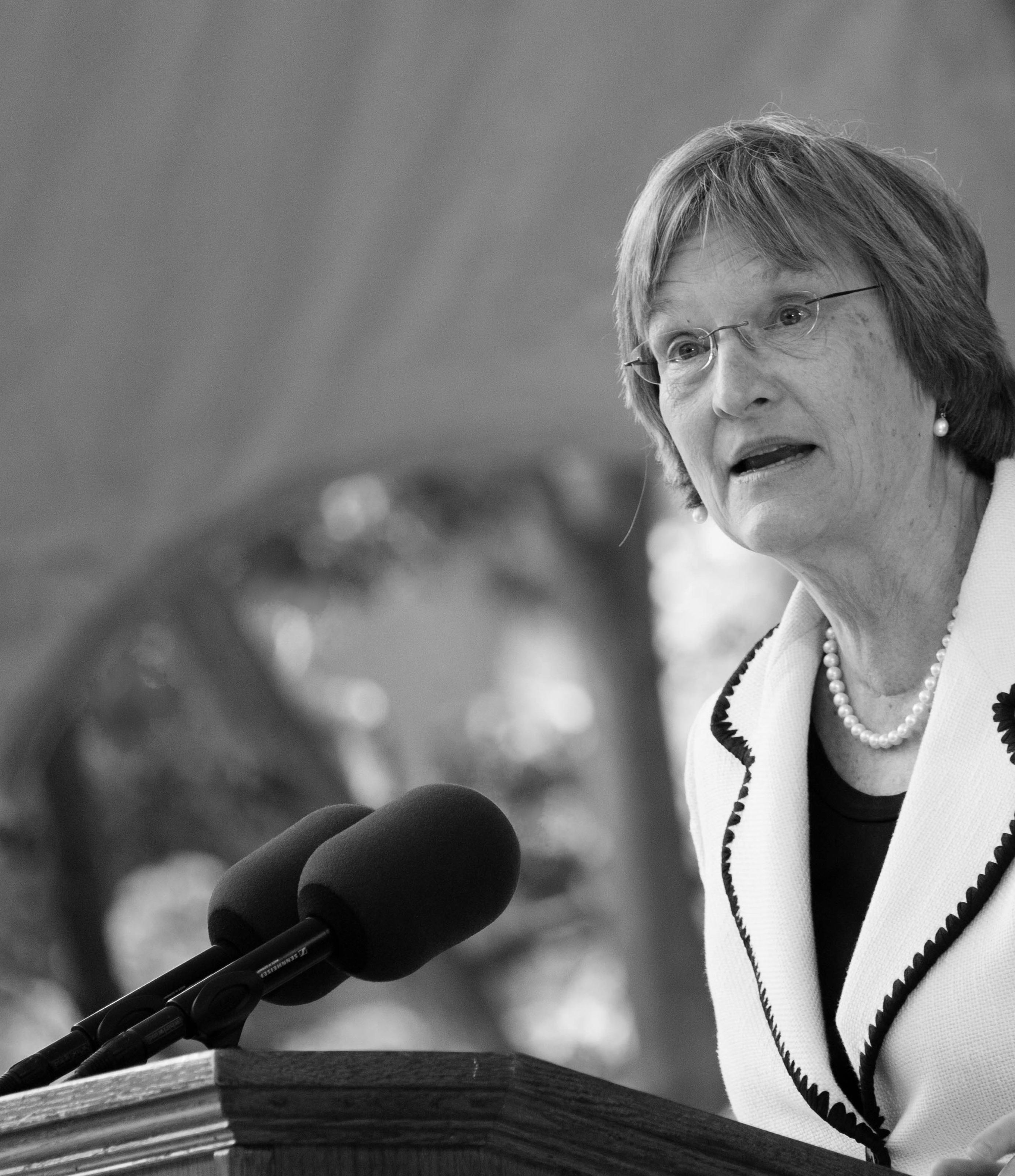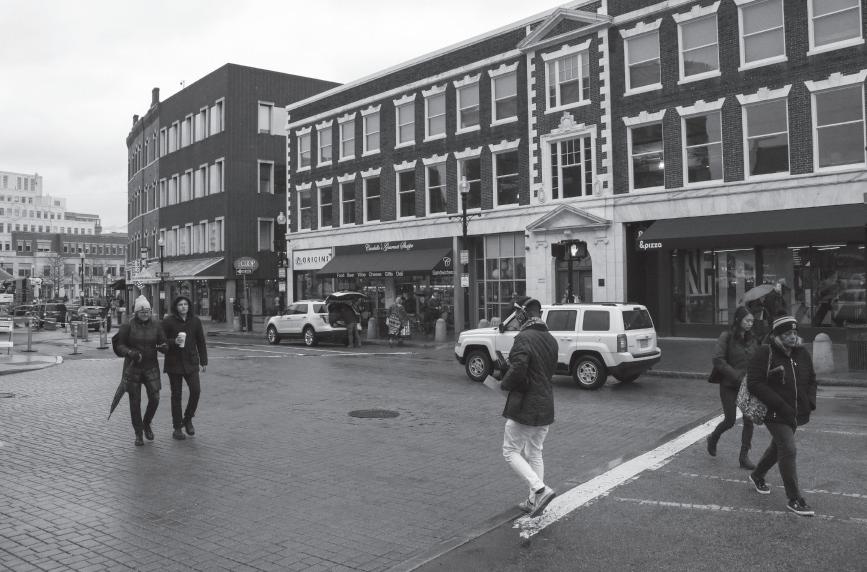
16 minute read
Editorial
THE CRIMSON EDITORIAL BOARD
Exploring Concentrations Should Be Fun
Aconcentration may only be the sum of its course requirements. But looking for a concentration — your concentration — should be so much more than that.
Since 2007, Advising Fortnight — the two-week, no-nonsense, see-as-muchas-you-can, head-down concentration blitz — turned freshman concentration deliberation into a serious and hasty, not to mention somewhat premature, affair. After all, students don’t have to choose a concentration until the coming fall. Much to our excitement, however, the Advising Programs Office has replaced Advising Fortnight with a new Exploring Fields of Study program.
Under the new program, each department will host a variety of informational events and advising sessions throughout the spring semester.
While many, like us, have welcomed this new adjustment with enthusiasm, others remain apprehensive. In particular, some advisors have cautioned that the semester-long schedule of events may hinder students’ ability to directly compare the experiences of different concentrations.
Indeed, if the objective of the Exploring Fields of Study program is simply to engage in a direct comparison of concentrations in order to make a firm decision by its completion, then offering a twoweek time frame to do so would prove most effective. But that’s not, or at least shouldn’t be, the point. While freshmen will in fact be prompted to report the conversation events they attended and whether they are considering declaring it by mid-April, this report is not a binding agreement and need not be approached as such.
Freshmen still have nearly two semesters, as well as an entire summer, before they need to make their concentration choices. Many students might use this gift of time by taking shot-in-thedark classes, joining outside-the-box clubs, and exploring new environments that may help them gain clarity on the types of futures they envision for themselves.
Viewing the Exploring Fields of Study program merely as a concentration selection process deprives freshmen of the ability to benefit from the intellectual growth and personal development that the ensuing months should bring. There are many data points to be gathered about a given concentration, and we encourage freshmen to gather as many as possible before they declare their concentrations — at one’s own pace and with the least possible anxiety.
Perhaps a more concentrated fortnight should be offered at the beginning of sophomore year for the benefit of students who are making final comparisons and decisions at the eleventh hour. But for freshmen, that just isn’t necessary yet.
In such a high-pressure environment, freshman concentration shopping should be one area in which to slow down and spread things out.
It’s also worth noting that choosing a concentration does not prevent students from pursuing interests in other departments and fields.
It is an immense privilege to study at a university that is committed to a liberal arts educational philosophy. We encourage students of all years to continue exploring fields of study well past their concentration choice is made.
This staff editorial solely represents the majority view of The Crimson Editorial Board. It is the product of discussions at regular Editorial Board meetings. In order to ensure the impartiality of our journalism, Crimson editors who choose to opine and vote at these meetings are not involved in the reporting of articles on similar topics.
Submit an Op-Ed Today!
The Crimson @thecrimson
Let’s Ignore White People COLUMN
Marcus B. Montague-Mfuni AFRICAN, AMERICAN
Woah now, white folk, don’t get defensive too quickly — it’s not about you. Actually, everyone else, that’s really my whole point here — it’s not about them.
One morning I was telling my father that I had been accepted to write this very column, “African, American,” about matters regarding my mixed identity as a black African and American. He shared his congratulations, then lovingly and concernedly shared a warning along with a Toni Morrison quote about racism.
A warning to not “get too trapped into black and white,” because, as Morrison says, “the very serious function of racism ... is distraction” from doing meaningful tasks — forcing you to constantly be proving yourself, your culture, your history to somebody else.
My father’s concern — while I graciously appreciate its intentions — caught me off guard, purely because I had not even thought of that.
My column was never going to be about “black and white” issues. My column was going to be about and for me, black people, and black issues, though anyone else’s readership and commentary is obviously welcome.
In fact, if you look at the style in which I write my other pieces, you will see that they are always addressed to “we”, “us”, and “our”, that is, black people. This piece, itself, is directed at the entire nonwhite population. I am not concerned with the conflict here. Here, I am concerned about us. Us. And I think that needs to be all of our central focus more often.
I thought of — on that morning I spoke to my father — a little preamble Nina Simone gave in a recording of her song about Lorraine Hansberry, “To Be Young Gifted and Black.”
In it, she says to a presumably largely white audience, “now, [the song] is not addressed primarily to white people, though it does not put you down in any way … it simply ignores you.”
After the crowd laughs, Nina explained her reasoning: “[her] people need all the inspiration and love that they can get.” Indeed, Nina, they certainly did then, and they certainly still do now.
So let us, then, ignore white people. I do not mean that in a foolish literal sense in our day-to-day lives in which we just walk past white people like they don’t exist — even as obscenely hilarious as it would be to me if this piece could possibly inspire that.
No, I mean let us take more time to deal with ourselves, for ourselves.Not to abandon the discussion around interracial or intercultural conflicts entirely. That has its place and is important. Rather, to have more conversations, more writing, more art, more songs, more pol
itics, more culture not about the conflict. More culture that’s not addressed to ourselves in the context of what white people are doing to us. More culture that is not speaking about the pain white people have previously caused us. More culture that, as Nina would have it, is not addressed to white people, that doesn’t put them down either ... that simply ignores them.
In many ways, it is exactly what Morrison was suggesting we do. Not explaining ourselves, our histories, and our cultures to anyone else but creating cultures, creating histories, and creating ourselves — for ourselves and no one else. In doing this we should trust that all of that shall be explained to everyone else naturally.
As I am confident it will be. Instead of trying to get our culture through to people, if we truly invest ourselves in ourselves, people will want to get themselves through our cultures. Nelson Makamo, a South African contemporary artist, makes his artwork to capture the hope, beauty, and wisdom of African peoples — not to prove it to anyone else. And people from around the world have flocked to engage with those pieces of culture.
Toni Morrison, herself, was familiar with the effect that the white gaze had on black people’s writing. And so she wrote without consideration of it. And now those are pieces of a culture that people want to engage with for their own enrichment.
I ask you, are we free from the powers of white supremacy if we cannot even speak as black people about black people, or if any other people can’t speak about themselves, without invoking white people?
I would argue no. You may, in turn, ask me: Marcus, so how can we not invoke white people in our conversations while we are still under the reigns of white supremacy? To that, my answer is simple. We just do.
I am not willing to wait for the ever-so historically gracious hand of white supremacy to ease its death grip on my throat before I start speaking directly with my fellow black people, and you shouldn’t be either.
If I am only willing to start those conversations on the timeline that the powers of white supremacy are okay with, I have then, and only then, let white supremacy win.
So do not stress, dad, and rest easy, Toni. I am not getting trapped or distracted by any black and white conflict. I am here to pour my love into my peoples and hopefully inspire other people to do the same. Accordingly, I shall continue to ‘ignore’ white people and address this column to my people. And I implore you, in whatever way, to start ignoring too.
OP-ED
How to Win 100 Percent of the Battles You Don’t Fight
We’ve all been there. It’s midnight and we know we should get some rest before the busy week, but somehow we can’t stop watching TikToks. Or we made that New Year’s resolution to get in shape by spring break and yet when the time comes to go to the gym, we just can’t quite pull it together. Why does this happen, again and again?
The heart of this problem lies in our conflicting desires. Part of us wants to just chill, but another part of us wants us to be doing something productive. Certainly, listening to the easy-going voice is sometimes appropriate. But in other situations, where we will be glad if we are able to get in shape or ace that class, how can we beat tempBy JONAS A.G. NELLE
tation and be our best selves?
One solution is to just grit our teeth and use our (will)power to battle through the temptation. Be the monk who meditates while experiencing extreme hunger. This approach has its advantages: Research suggests that exercising willpower more frequently leads to greater willpower in the long run, just like training a muscle. The data also show that people with more willpower tend to live better lives, from improved health to higher self-esteem and greater financial security. So, next time you’re tempted, just use your willpower. Duh!
Not so fast. There are times when willpower is not enough, whether it’s because our willpower is depleted because we exhausted it in other situations, or even just because we slept badly. We might also not want to use our mental energy on routine challenges such as going to bed on time or eating healthy because we know we will need that willpower later on to overcome other, more important temptations.
The solution is systemization: To invest mental energy now, when we are not tempted, in order to put in place systems that free our future selves from facing the temptation at all. By thoughtfully crafting the environment we make choices in, we can avoid having to use our willpower, at least for choices we face regularly.
Eventually, we will become so used to these environments and the good choices they help us make that what was once an effortful battle becomes habitual. If fighting temptation is the battle, the systematization solution is to, in fact, not fight all … and still win.
Taking time to build a system to avoid temptation is most useful when the temptation is particularly strong and when the potential gains from resisting it are large.
Systematization can also be particularly valuable for situations that take place frequently, such as our daily morning routines.
While there are no universal systems that everyone should adopt, there are some examples that are likely helpful for most of us. For instance, to avoid spending time on your phone in bed (which is bad not least for your quality of sleep), it might help to have your phone charger at your desk — away from your bed.
Instead of relying on your tempted future self to make the right decision, this setup allows you to avoid the temptation altogether. An even stronger system would be to turn your phone all the way off when you enter your dorm room for the night. Another situation many of us struggle with is eating healthy given the vast array of unlimited food in the dining halls.
One approach to this problem could be to make a habit out of eating a plate of salad before taking any other food. Of course, not buying unhealthy snacks to keep in your dorm room is a great strategy as well. Without unhealthy food readily available, it becomes much easier to resist late-night cravings.
Bonus points for finding healthy snacks that help satisfy the craving while also providing the nourishment your body needs. Good systems like these require little or no mental energy to follow in the moment. By channeling our everyday lives, they allow us to attend to the things that really matter instead of fighting ourselves.
The next time you find yourself tempted but know you really should be doing something else, take two minutes to come up with a system that will help you avoid the temptation in the first place. Your future self will thank you for it, I promise.
SFFA Files Brief in Ongoing Lawsuit
central to its educational mission and consistent with longstanding Supreme Court precedent,” Dane wrote. “Today’s filing by Students for Fair Admissions further exposes their ultimate goal of removing the consideration of race in college and university admissions.”
SFFA president Edward J. Blum wrote an emailed statement that the organization hopes the appeals process will ultimately reverse the district court ruling.
“It is our hope the First Circuit Court of Appeals will reverse the lower court’s erroneous opinion and compel Harvard to end the use of race in their admissions policies,” Blum wrote.
In one of the Tuesday brief’s arguments, SFFA’s lawyers highlighted their belief that the court erred in applying strict scrutiny. Burroughs accepted Harvard’s arguments, despite the fact that, according to SFFA, Harvard failed to prove that it does not discriminate.
“This analysis is irreconcilable with strict scrutiny,” the appellate brief reads. “Given the serious doubts that the district court harbored, Harvard by definition has not ‘offered sufficient evidence that would prove that its admissions program is narrowly tailored to obtain the educational benefits of diversity.’ The case should have ended there.”
SFFA’s lawyers also contested that Burroughs failed to fully appreciate statistical evidence, evidence related to subjective standards for “personal ratings” in admissions, and internal Harvard communications about concerns over possible discrimination.
The brief’s conclusion is straightforward, reading, “The district court’s judgment should be reversed.”
SFFA’s filing marks just the latest move in a protracted legal battle that has brought national attention on to Harvard’s admissions policies. Documents released throughout the case have revealed previously confidential details about the admissions process, such as how the College considers applications from athletes and relatives of major donors.
Harvard is scheduled to issue its reply brief within 30 days. SFFA will then have three weeks to publish another response to Harvard’s brief.
benjamin.fu@thecrimson.com dohyun.kim@thecrimson.com
Cambridge City Council Talks Harvard Square Zoning Rules
By JULIA A. KENDALL CRIMSON STAFF WRITER
The Cambridge City Council Ordinance Committee convened a special meeting Tuesday to push forward a zoning amendment that attempts to support and increase the number of local businesses in Harvard Square.
The amendment grants exemptions for small businesses who develop retail spaces that are less than 1,500 feet, imposes building height restrictions, and enacts less parking requirements. The Ordinance Committee called the meeting to vote on whether or not the petition should move ahead to a second reading — a step necessary for the amendment to eventually be put into law by the Council. The amendment passed in a unanimous vote.
Cambridge resident Patrick W. Barrett III wrote the petition discussed at the meeting. Barrett worked alongside the Harvard Square Neighborhood Association, the Harvard Square Business Association and Harvard University to craft the proposal.
“In Central Square I did something very similar a couple of years ago where I changed some of the zoning to mitigate some of the more archaic pieces of zoning that we have here. [It was] not nearly enough to fix [it] and this isn’t either,” Barrett said. “This is more like a better foundation for what they could build off of if they decided to.”
Patrick W. Barrett III Cambridge Resident
The petition comes after businesses like Black Ink, Flat Patties, and Crema Cafe have all closed their doors amid rising rents.
Barrett said if the petition passed the Council, it would deter the opening of two banks in the Square — businesses which he said reduced foot traffic and occupied a “large portion” of space in “prominent” buildings. “The bank facades eat up a large portion of some of the more prominent buildings, and what it has the effect of doing is killing those areas for foot traffic, especially at nighttime uses as well,” said Mr. Barnett.
The special meeting was convened to ensure the petition could be considered before its expiration March 10.
In an interview after the meeting, former Cambridge mayor and current City Councilor Denise E. Simmons said today’s vote will give the councilors time to evaluate changes to the petition. She said the Council will discuss the petition at their weekly meeting Monday.
“By voting it to a second reading, we are just making sure it stays on track for ordination and it also gives us an opportunity to do what I think my colleagues want to do, which is to look at the new proposed language,” Simmons said.
“Now we have four days to read through, and we’re going to discuss it on Monday,” she added.
Barrett said he has worked to ensure that the petition will pass with minimal opposition. “I bring groups together and spend a lot of time with them, so that we don’t run into these kinds of problems when we get to play on board, wardens committee, or Council with everyone sort of losing their mind and screaming and yelling at each other because no one really reacts very well to that,” Barrett said. “So, opponents — I would say none.”
julia.kendall@thecrimson.com
Like The Crimson on Facebook.

Facebook.com/ TheHarvardCrimson
Don’t stop there. Facebook.com/ CrimsonFlyby
The inside scoop on Harvard, straight to your inbox.





